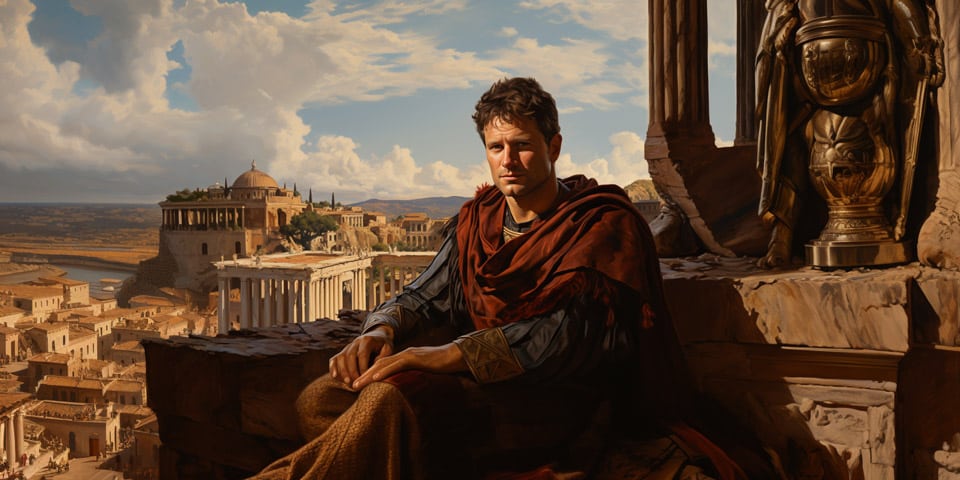

25146 views

Caesar Augustus (27 BCE – 14 CE) was the first emperor of the Roman Empire. He was born with the name Gaius Octavius Thurinus on 23 September 63 BCE and adopted by his great-uncle Julius Caesar in 44 BCE. Consequently, he took the name Gaius Julius Caesar. Later on, in 27 BCE, the Senate proclaimed him the honorific Augustus, which means “the illustrious one,” so he became known as Gaius Julius Caesar Augustus.
Despite the fact of owing many names, he is commonly known as Octavius in the period of events between 63 and 44 BCE, Octavian between 44 and 27 BCE and Augustus between 27 BCE until his death in 14 CE.
Contents
ToggleEmperor Augustus, the founding Roman Emperor, remains an iconic historical figure. From his early days as Octavian to his lasting impact as the architect of the Pax Romana, his life and legacy continue to fascinate. This section addresses popular questions about his leadership, political strategies, and personal life. Test your knowledge about Emperor Augustus as we explore the intricacies that made him a transformative leader and a subject of enduring curiosity.
After the assassination of the step-father of Augustus, Julius Caesar, in March of 44 BCE, the first emperor created an alliance with Caesar’s close friend and relative, Mark Antony. Also, another supporter of Caesar, Marcus Aemilius Lepidus, joined them, and it became the reason for the formation of the Second Triumvirate in October of 43 BCE.
The first objective of the new alliance was to kill all the political rivals and supporters of Caesar’s assassins. It is not clear who was the main responsible among the three for the killings; some writers and historians call Augustus innocent, while others consider him the most bloodshed. After completing their first aim, the Triumvirate focused on Caesar’s assassins. At the battle of Phillipi in 42 BCE, the army of Brutus and Cassius was attacked by the forces of the Triumvirate, which forced both assassins to commit suicide.
Octavian and Lepidus attacked Sextus Pompeius (son of Pompey, main rival of Caesar) for the leadership of Rome with the help of Antony from Egypt
Undoubtedly, the Second Triumvirate was successful in the battle over Pompeius, so Lepidus pushed Octavian to leave Sicily, the theatre of operations, with his army. However, Octavian proposed a huge amount of money to the troops of Lepidus, so they defected to him. Consequently, Lepidus lost all his titles, except Pontifex Maximus, and the Second Triumvirate came to an end.
When the Second Triumvirate came to an end, relations between Octavian and Mark Antony became much worse. Later, in 40 BCE, Octavian tried to save their alliance and gave his sister, Octavia Minor, in marriage to Antony. However, Antony acquired strong relationships with Cleopatra VII of Egypt, who was the former lover of Caesar and mother of his son Caesarion, but with time, became a lover of Antony.
This romance leads to the conflict between Octavian and Antony, where Octavian accuses him in use of his sister. As a result, Octavia and Antony became divorced.
Octavian started to consider Antony inappropriate leader in political, private and military spheres
Caesar’s adopted son made the priestesses of the temple of Vesta surrender the will of Antony, which he read in the Senate. Consequently, the will passed Roman territories to the sons of Antony and included instructions for a grand mausoleum to be constructed in Alexandria for Antony and his love, Cleopatra.
Octavian called his ex-supporter a renegade. At the same time, the worst declaration of Antony was about Caesarion’s true heir, Julius Caesar. However, the Senate rejected Antony’s consulship and started the war on Cleopatra VII. Later on, at the Battle of Actium in 31 BCE, the army of Octavian with General Agrippa destructed forces of Antony and Cleopatra and pursued them until 30 BCE. Consequently, Antony and Cleopatra lost Alexandria and committed suicide. Moreover, Octavian strangled Caesarion, claiming that “two Caesars are one too many,” while Antony’s eldest son was killed because Octavian considered him as a threat to Rome.
These events led Octavian to the absolute leadership over Rome
Octavian decided to get rid of the same situation as his father had, and immediately after coming to power, he characterized his political strategies to the population, thus making people believe that he wanted to make Rome better. In 27 BCE, Octavian denied his powers, knowing that he would receive them back from the Senate, who also gave him “Augustus.” He preferred to call himself in public as “Princeps” or the “First Citizen.” People trusted him, and Augustus managed to gain absolute control over Rome and its colonies.
Being already known as Augustus, the month of August was named in honor of the first Emperor. In 19 BC, Augustus received supreme power over each province of the Roman Empire and started to rule supremely.
By 2 BCE Augustus was proclaimed Pater Patriae, the father of the country.
Undoubtedly, the period of his reign was positive for the Empire since he supported peace among citizens and raised the economy, arts, and agriculture. In addition, during the leadership of the first emperor, many new buildings were created, where Augustus implemented the plans made by Caesar and developed many of his own designs. For instance, he restored 82 buildings in one year, including the public baths of Rome, with his main supporter, Agrippa. Moreover, Augustus was an art lover and inspired many artists who composed poems about him. For example, poet Virgil composed the Aeneid. Many reforms and new laws were created during the reign of Augustus. His aim was to support stability in marriages and to increase the birth rate. Thus, there were penalties for childless marriages and reduced taxes for families with more than three children.
Augustus died in 14 CE. His last words became famous: “I found Rome a city of clay but left it a city of marble.” However, his wife Livia and adopted son Tiberius, who became the second emperor in the history of the Roman Empire, his last words were: “Have I played the part well? They applaud as I exit.” The body of the emperor was buried in Rome.
During his reign, the emperor expanded Roman Forum and today, you can visit remainings of Forum of Augustus in the center of Rome.
Emperor Augustus, the founder of the Roman Empire, has been immortalized in numerous statues that have survived to this day.
Interestingly, these statues almost universally depict him as a young and robust individual, perpetuating an image of eternal youth and vitality. This stands in stark contrast to the fact that he lived until the age of 75.
With the advent of modern computer technology and artificial intelligence capabilities, we have now recreated portraits of Emperor Augustus. These lifelike representations provide an opportunity to gaze upon a face that has captivated historians and art enthusiasts alike, albeit through the lens of classical artistic ideals.
Ready to geek out on some Roman architecture? If you’re hitting up Rome, you’ve got to know your stuff about Augustus, the OG emperor who turned Rome into an architectural wonderland. Let’s deep-dive into some iconic structures built during his reign, shall we?
So, here’s the skinny: Ara Pacis isn’t just some altar; it’s a legit masterpiece of Roman sculpture. Built to venerate Pax, the Roman chill-out goddess of peace, this baby was inaugurated on Livia’s (Augustus’ wife) birthday. Talk about husband’s points! Besides, the friezes on it are so detailed they’re like a comic strip telling the story of the Pax Romana.
Augustus basically felt the OG Roman Forum was too crowded—like a mall on Black Friday. So, he gave Rome the Forum of Augustus, featuring the badass Temple of Mars Ultor. Why Mars Ultor? ‘Cause Mars was the avenger, who helped him squash his enemies at Philippi. Epic, right?
This wasn’t just a family tomb; it was a statement piece! Augustus was basically saying, “Hey, we’re gonna be ruling Rome for a long time, so get used to these faces!” It was made with concentric rings and an earthen mound covered with cypress trees. Also, the ashes were in golden urns. Bling-bling!
Named after his nephew Marcellus (who kicked the bucket super young), this was Rome’s go-to spot for live performances. The design was so killer it later inspired the Colosseum. It could hold 20,000 folks, who were divided based on social class because, ya know, Romans loved their hierarchy. Read more about the Theater of Marcellus.
Imagine a massive sundial doubled as a calendar. That’s the Solarium Augusti for you. The Egyptian obelisk in the middle? That’s from Heliopolis, Egypt, and it acted like the sundial’s needle. Timekeeping and one-upmanship, all in one!
Named for his sister Octavia, this was an upgrade that was so much more than a fresh coat of paint. The place became a hub for libraries and lecture halls and even boasted some fabulous artwork. Plus, it’s mentioned in Shakespeare’s “The Merchant of Venice,” so it’s got some serious cred!
Originally started by Caesar himself, Augustus finished the job. It’s like saying, “Hey, I’m keeping the family legacy going!”. It’s the first temple for a deified Roman, guys. It’s where people would come to make offerings to the spirit of Julius Caesar and where the famous “Ides of March” altar is.
Water, anyone? This wasn’t just a construction project but a public health revolution. Built to bring clean water into the city, it’s one of the few Roman aqueducts still working. How’s that for built to last?
There you go! Next time you wander around Rome, drop some of these knowledge bombs, and your pals will think you’ve got a Ph.D. in Roman architecture or something.
Heading to Rome? Dive into the captivating world of Emperor Augustus, a monumental figure in history. This section is packed with intriguing facts that will enrich your travel experience. Amaze your friends with your newfound knowledge of the man who shaped the Roman Empire.
Author: Artur Jakucewicz
This website uses cookies. For more info read the cookies policy
Rome.us © 2026. Created with love by Roman experts and guides.